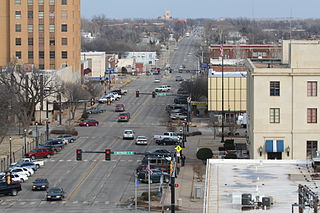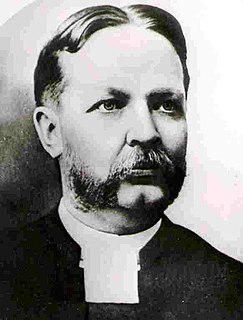Related Research Articles

Kansas is a state in the Midwestern United States. Its capital is Topeka and its largest city is Wichita. Kansas is bordered by Nebraska to the north; Missouri to the east; Oklahoma to the south; and Colorado to the west. Kansas is named after the Kansas River, which in turn was named after the Kansa Native Americans who lived along its banks. The tribe's name is often said to mean "people of the (south) wind" although this was probably not the term's original meaning. For thousands of years, what is now Kansas was home to numerous and diverse Native American tribes. Tribes in the eastern part of the state generally lived in villages along the river valleys. Tribes in the western part of the state were semi-nomadic and hunted large herds of bison.

Winter wheat are strains of wheat that are planted in the autumn to germinate and develop into young plants that remain in the vegetative phase during the winter and resume growth in early spring. Classification into spring or winter wheat is common and traditionally refers to the season during which the crop is grown. For winter wheat, the physiological stage of heading is delayed until the plant experiences vernalization, a period of 30 to 60 days of cold winter temperatures.

The Midwestern United States, also referred to as the Midwest or the American Midwest, is one of four census regions of the United States Census Bureau. It occupies the northern central part of the United States. It was officially named the North Central Region by the Census Bureau until 1984. It is between the Northeastern United States and the Western United States, with Canada to its north and the Southern United States to its south.

Hays is a city in and the county seat of Ellis County, Kansas, United States. The largest city in northwestern Kansas, it is the economic and cultural center of the region. As of the 2010 census, the city population was 20,510. It is also a college town, home to Fort Hays State University.

Enid is the ninth-largest city in the U.S. state of Oklahoma. It is the county seat of Garfield County. As of the 2010 census, the population was 49,379. Enid was founded during the opening of the Cherokee Outlet in the Land Run of 1893, and is named after Enid, a character in Alfred, Lord Tennyson's Idylls of the King. In 1991, the Oklahoma state legislature designated Enid the "purple martin capital of Oklahoma." Enid holds the nickname of "Queen Wheat City" and "Wheat Capital" of Oklahoma and the United States for its immense grain storage capacity, and has the third-largest grain storage capacity in the world.

Corn is a town in Washita County, Oklahoma, United States. The population was 503 at the 2010 census.

The Panic of 1893 was an economic depression in the United States that began in 1893 and ended in 1897. It deeply affected every sector of the economy, and produced political upheaval that led to the political realignment of 1896 and the presidency of William McKinley.

The American Legion, commonly known as the Legion, is a nonprofit organization of U.S. war veterans headquartered in Indianapolis, Indiana. It is made up of state, U.S. territory, and overseas departments, and these are in turn made up of local posts. The organization was formed on March 15, 1919, in Paris, France, by a thousand officers and men of the American Expeditionary Forces, and it was chartered on September 16, 1919, by the United States Congress.
The U.S. state of Kansas, located on the eastern edge of the Great Plains, was the home of nomadic Native American tribes who hunted the vast herds of bison. In around 1450 AD, the Wichita People founded the great city of Etzanoa. The city of Etzanoa was abandoned in around 1700 AD. The region was explored by Spanish conquistadores in the 16th century. It was later explored by French fur trappers who traded with the Native Americans. Most of Kansas became permanently part of the United States in the Louisiana Purchase of 1803. When the area was opened to settlement by the Kansas–Nebraska Act of 1854 it became a battlefield that helped cause the American Civil War. Settlers from North and South came in order to vote slavery down or up. The free state element prevailed.

The Corn Belt is a region of the Midwestern United States that, since the 1850s, has dominated corn production in the United States. In the United States, "corn" is the common word for "maize". More generally, the concept of the "Corn Belt" connotes the area of the Midwest dominated by farming and agriculture.
The history of agriculture in the United States covers the period from the first English settlers to the present day. In Colonial America, agriculture was the primary livelihood for 90% of the population, and most towns were shipping points for the export of agricultural products. Most farms were geared toward subsistence production for family use. The rapid growth of population and the expansion of the frontier opened up large numbers of new farms, and clearing the land was a major preoccupation of farmers. After 1800, cotton became the chief crop in southern plantations, and the chief American export. After 1840, industrialization and urbanization opened up lucrative domestic markets. The number of farms grew from 1.4 million in 1850, to 4.0 million in 1880, and 6.4 million in 1910; then started to fall, dropping to 5.6 million in 1950 and 2.2 million in 2008.

The St. Louis Southwestern Railway Company, known by its nickname of "The Cotton Belt Route" or simply "Cotton Belt", is a former Class I railroad that operated between St. Louis, Missouri, and various points in the U.S. states of Arkansas, Tennessee, Louisiana, and Texas from 1891 to 1980, when the system added the Rock Island's Golden State Route and operations in Kansas, Oklahoma, and New Mexico. The Cotton Belt operated as a Southern Pacific subsidiary from 1932 until 1992, when its operation was assumed by Southern Pacific Transportation Company.
The North American Confederacy is an alternate history series of novels created by L. Neil Smith. The series includes the novel The Probability Broach and its sequels and takes place in a country of the same name.

Elk was an unincorporated community in Chase and Marion counties in the U.S. state of Kansas. It is currently a ghost town that lays along Middle Creek northwest of Elmdale and straddled the county line between Chase and Marion County.

Carl Aaron Swensson was an American Lutheran minister and founder and President of Bethany College.

Frank Heywood Hodder was an American historian and a professor first at Cornell University (1885-1890) and later at the University of Kansas.
The Kansas Historical Quarterly (1931–1977) was an academic journal published by the Kansas State Historical Society in Topeka, Kansas. The journal focused on the history of Kansas. Editors-in-chief included James C. Malin, Kirke Mechem, and Nyle H. Miller. It replaced the Society's earlier publication, Kansas Historical Collections (1875–1928), and was succeeded by Kansas History: A Journal of the Central Plains.
Wheat is produced in almost every state in the United States, and is the principal cereal grain grown in the country. The type and quantity vary between regions. The US is ranked third in production volume of wheat, with almost 58 million tons produced in the 2012–2013 growing season, behind only China and India. The US is ranked first in crop export volume; almost 50% of its total wheat production is exported.

Eugene Fitch Ware, sometimes publishing pseudonymously as Ironquill, was an American soldier, lawyer, politician, and writer.
References
- ↑ "Encyclopedia of the Great Plains - MALIN, JAMES C. (1893-1979)". plainshumanities.unl.edu.
- ↑ "James C. Malin: An Appreciation - Kansas Historical Society". www.kshs.org.
- ↑ Hodges, J. A. (27 May 2018). "Review of Winter Wheat in the Golden Belt of Kansas". Journal of Farm Economics. 26 (4): 814–816. doi:10.2307/1232132. JSTOR 1232132.